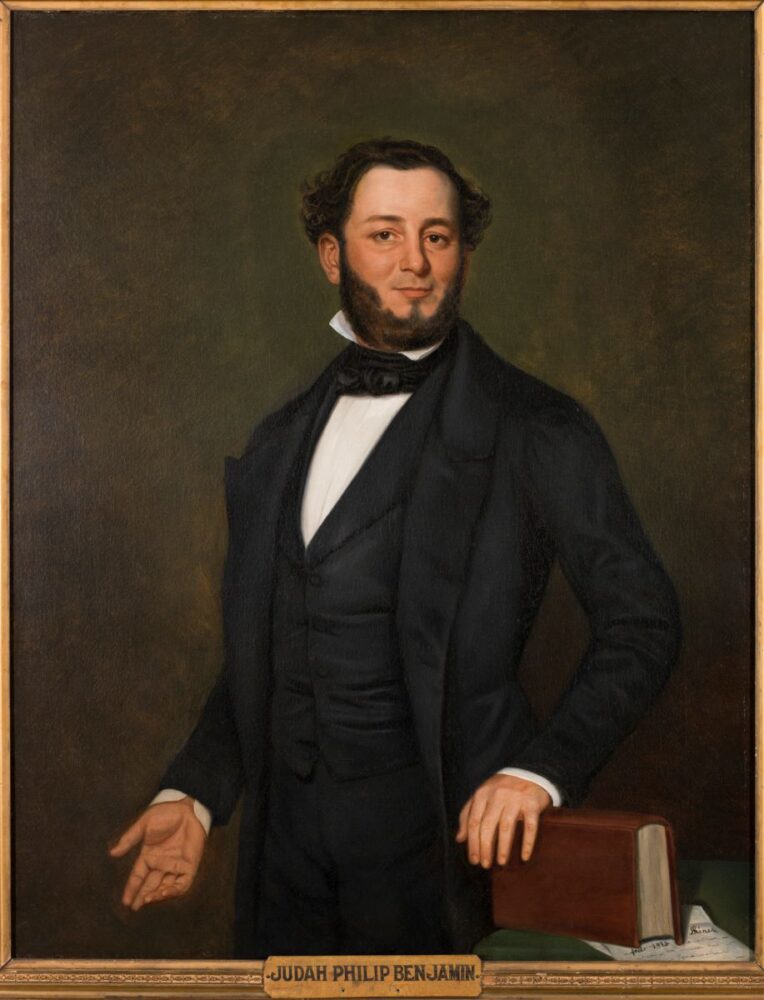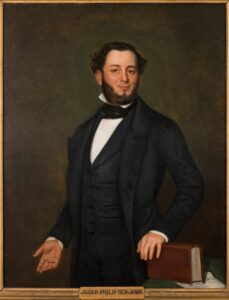Judah P. Benjamin
Judah P. Benjamin was one of the nineteenth-century South’s most prominent attorneys and statesmen.

Louisiana Supreme Court
Portrait of Judah P. Benjamin by Louis Nicolas Adolphe Rinck.
Judah P. Benjamin was one of the nineteenth-century South’s most prominent attorneys and statesmen. A Jewish immigrant to the United States, he served in multiple political positions in antebellum Louisiana and the Confederacy.
Benjamin was born in St. Croix in 1811. His family immigrated to the United States two years later, first settling in North Carolina and then in Charleston, South Carolina. While his family struggled financially, the local Jewish community recognized Benjamin’s brilliance and paid for him to attend Yale College as a fourteen-year-old. He did well academically but was dismissed two years later for unclear reasons.
Like many Americans in the early nineteenth century, Benjamin restarted his life by heading west. In 1828, at seventeen, he arrived in New Orleans and studied law as a clerk. In 1834, two years after passing the bar, Benjamin, along with Thomas Slidell, authored Digest of the Reported Decisions of the Superior Court of the Late Territory of Orleans and the Supreme Court of the State of Louisiana, a compendium of over six thousand legal cases. He would soon be considered a foremost expert on commercial law in the state.
In Louisiana Benjamin demonstrated his ability to assimilate into and succeed in new surroundings. By the early 1840s he had adopted all trappings of the state’s Creole elite except for converting to Catholicism. He married a planter’s daughter, spoke French, owned a sugar plantation and 140 enslaved people, and was a prosperous attorney. However, his 1833 marriage to Natalie St. Martin proved to be a failure by the social standards of the day. In 1844 Natalie and their infant daughter Ninette moved to Paris, and the family would live apart for most of Benjamin’s life. This separation would fuel scholarly speculation about Natalie’s infidelity and Benjamin’s homosexuality, which remain unresolved today.
Meanwhile, Benjamin’s political life prospered. As was typical of a pro-tariff sugar planter and a champion of railroads, Benjamin found a home in the Whig Party. He was elected to the state’s 1845 constitutional convention and served in both houses of the state legislature. In 1852 the state legislature elected him to the US Senate. This election made him either the first or second Jewish man elected to that body. (Florida previously elected David Levy Yulee, who was born Jewish but converted to the Episcopalian Church.)
Entering the Senate during the turbulent 1850s, Benjamin defended slavery but was not a radical. As the Whig party collapsed, he joined most southerners in the Democratic party. Unlike many of his colleagues, he remained in Washington year-round. When the Senate was not in session, he demonstrated his legal expertise through multiple appearances before the US Supreme Court. After Abraham Lincoln’s 1860 election, Benjamin felt that compromises could no longer save the Union. He enthusiastically endorsed his state’s decision to secede and adopted a more radical tone. In his farewell address to the Senate, Benjamin sounded like an extremist, thundering, “You never can subjugate us; you never can convert the free sons of the soil into vassals. … you never can degrade them to a servile and inferior race. Never! Never!”
While in Washington, Benjamin had befriended Mississippi Senator Jefferson Davis. Their relationship had begun poorly—almost ending in a duel—but they soon moved past that misunderstanding. When the Confederacy selected Davis as its president, he assembled a cabinet that included representatives from each state, and he chose Benjamin as the Confederacy’s first attorney general. Considered “the brains of the Confederacy,” Benjamin would prove to be Davis’s most trusted advisor during the Civil War.
While Benjamin’s legal acumen made him a natural choice as attorney general, the position—in a nation lacking federal courts and at war for independence—was less important than other cabinet departments. Within months Davis found Benjamin a more important post, installing him as secretary of war in September 1861. Benjamin’s brief term was tumultuous. He struggled to find the weapons and supplies needed by Confederate soldiers. More significant, he found himself caught up in the political infighting among Confederate generals and their supporters in the capital of Richmond. For the first time in his public life, Benjamin found himself the target of substantial anti-Semitic attacks. Opponents blamed him for every southern setback but especially for the fall of Roanoke Island in February 1862.
Davis recognized that Benjamin lacked military expertise and experience and that he was a poor fit as secretary of war. In March 1862 the president named Benjamin secretary of state. He would remain in this position, and as Davis’s closest confidante, for the remainder of the war. As secretary of state, Benjamin subscribed to the theory that cotton was king, believing that European powers could not afford to challenge the South without weakening their economies. However, England, with an oversupply of southern cotton and new sources in Egypt and India, did not align with this plan. Thus Benjamin never succeeded in convincing England or France to recognize the Confederacy.
Regardless of diplomatic or military reverses, Benajmin remained optimistic far longer than most Confederates. In 1864 he still believed that victory was close. Benjamin, again unlike most other Confederates, expressed a willingness to end slavery if it would facilitate Confederate independence. In particular he endorsed the 1864 Kenner mission, which authorized fellow Louisiana sugar planter Duncan Kenner to travel to Europe to offer emancipation in exchange for European recognition.
The reality of Union arms trumped Benjamin’s optimism, and in April 1865 he fled Richmond alongside President Davis. In North Carolina, they split up. Davis was soon captured, but Benjamin escaped through Florida to the Bahamas and ultimately to England. He landed on his feet. He quickly ascended to the highest ranks of the English bar and authored a commercial treatise colloquially known as Benjamin on Sales, a key British legal text still in print in the twenty-first century.
In 1879, thirty-five years after his wife left for Paris, Benjamin announced plans to join her and build a mansion there. He would not enjoy a long retirement. In 1880 he severely injured himself falling from a tram. Two years later, he suffered a heart attack. In 1884 heart troubles returned, and he died in Paris on May 6, 1884.
Throughout his life, Benjamin went to great lengths that ensured historians would be unable to truly understand him. He destroyed letters written to him, never kept a diary, and never wrote a memoir. Consequently, it is hard to separate fact from fiction in his life. Scholars will never learn why he was dismissed from Yale, why he lived apart from his wife and daughter, whether he was homosexual, or the extent of his commitment to Judaism.
Nevertheless, one does not need Benjamin’s own words to recognize his importance. Davis reputedly described him as “a master of law and the most accomplished statesman I have ever known.” While that description may be hyperbole, it provides a sense of Benjamin’s significance to nineteenth-century US history.
